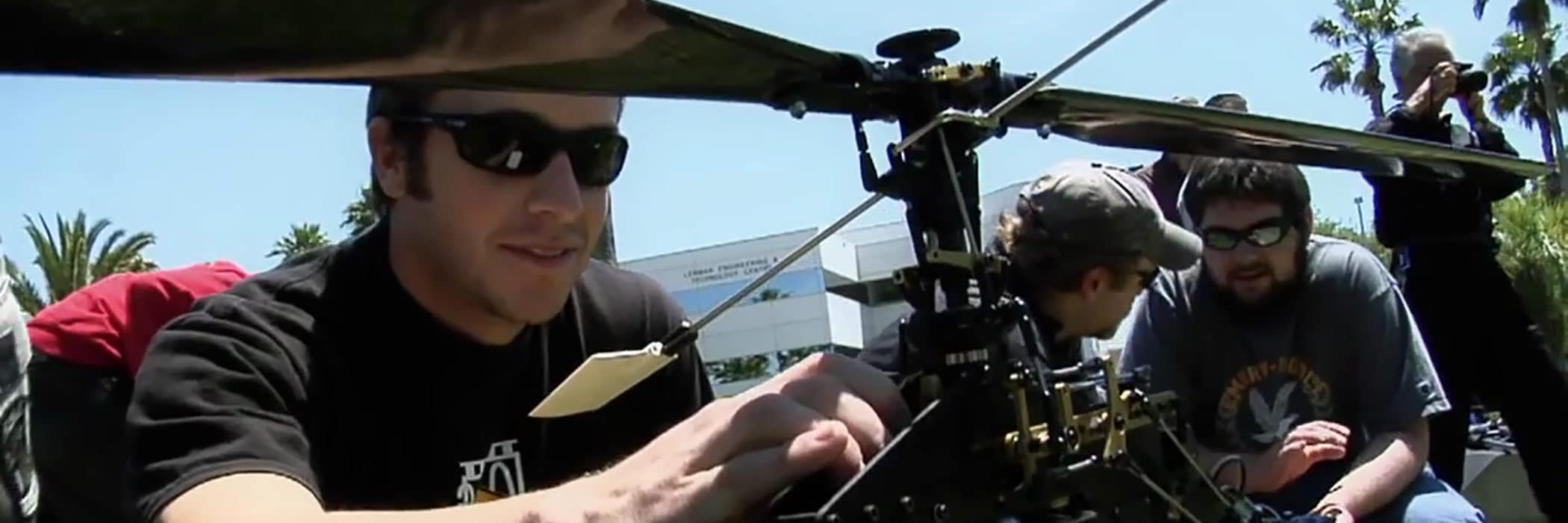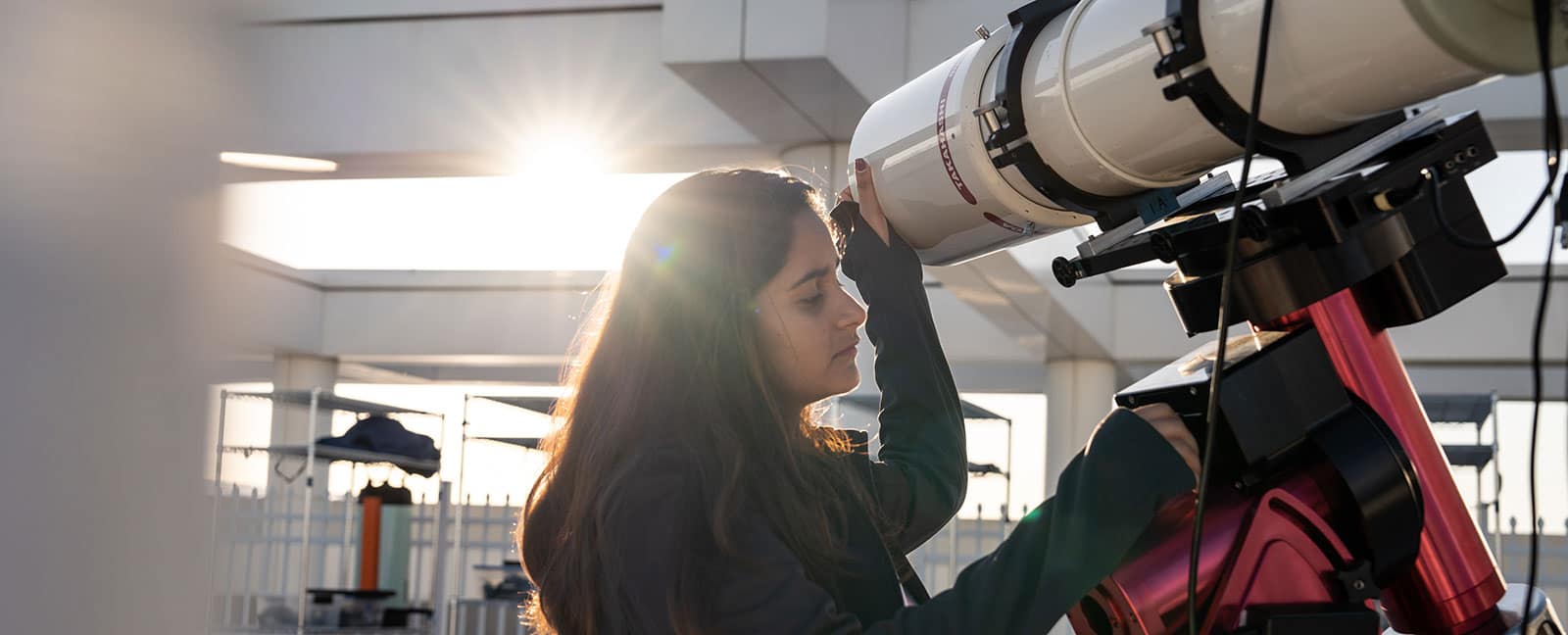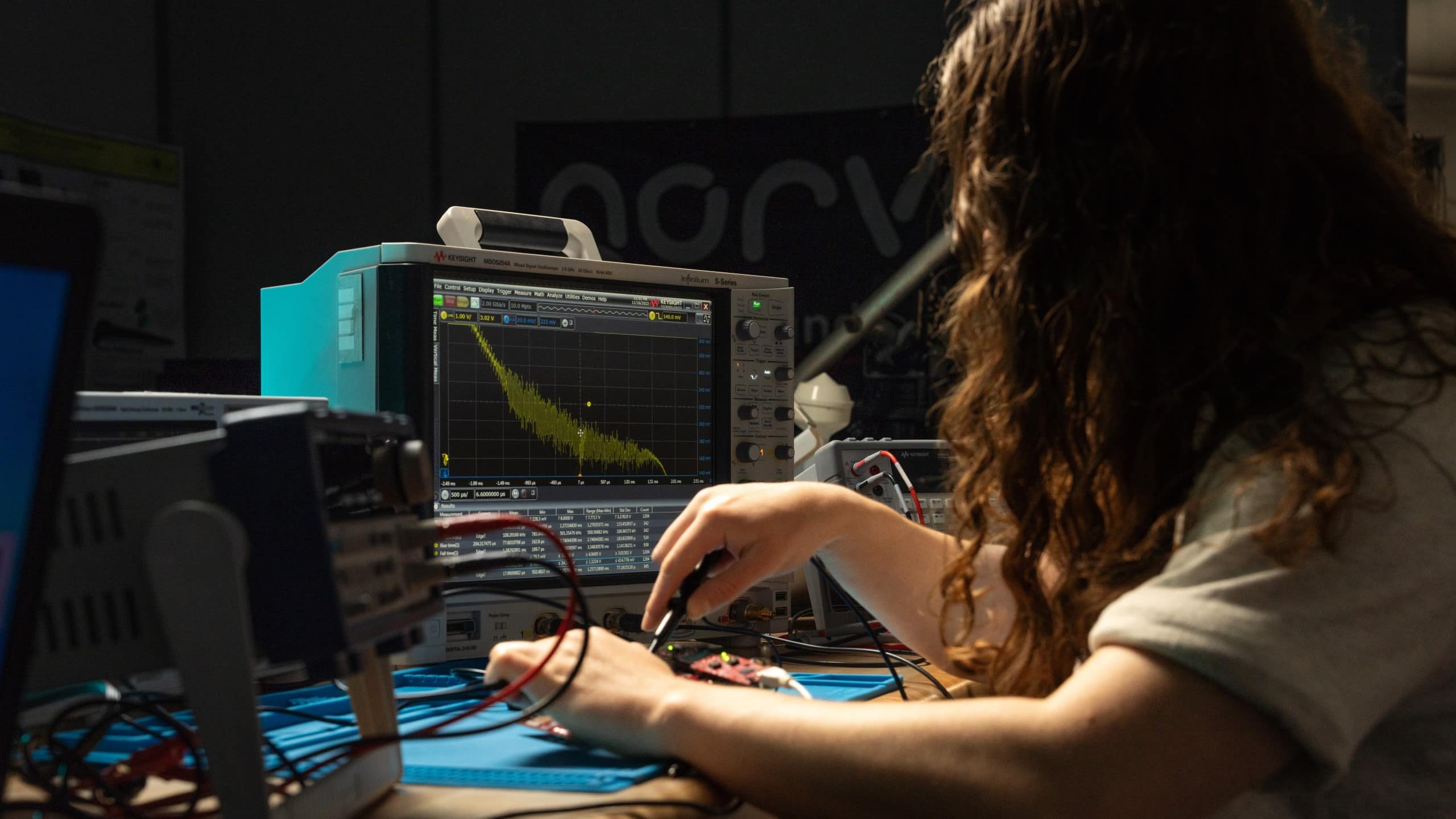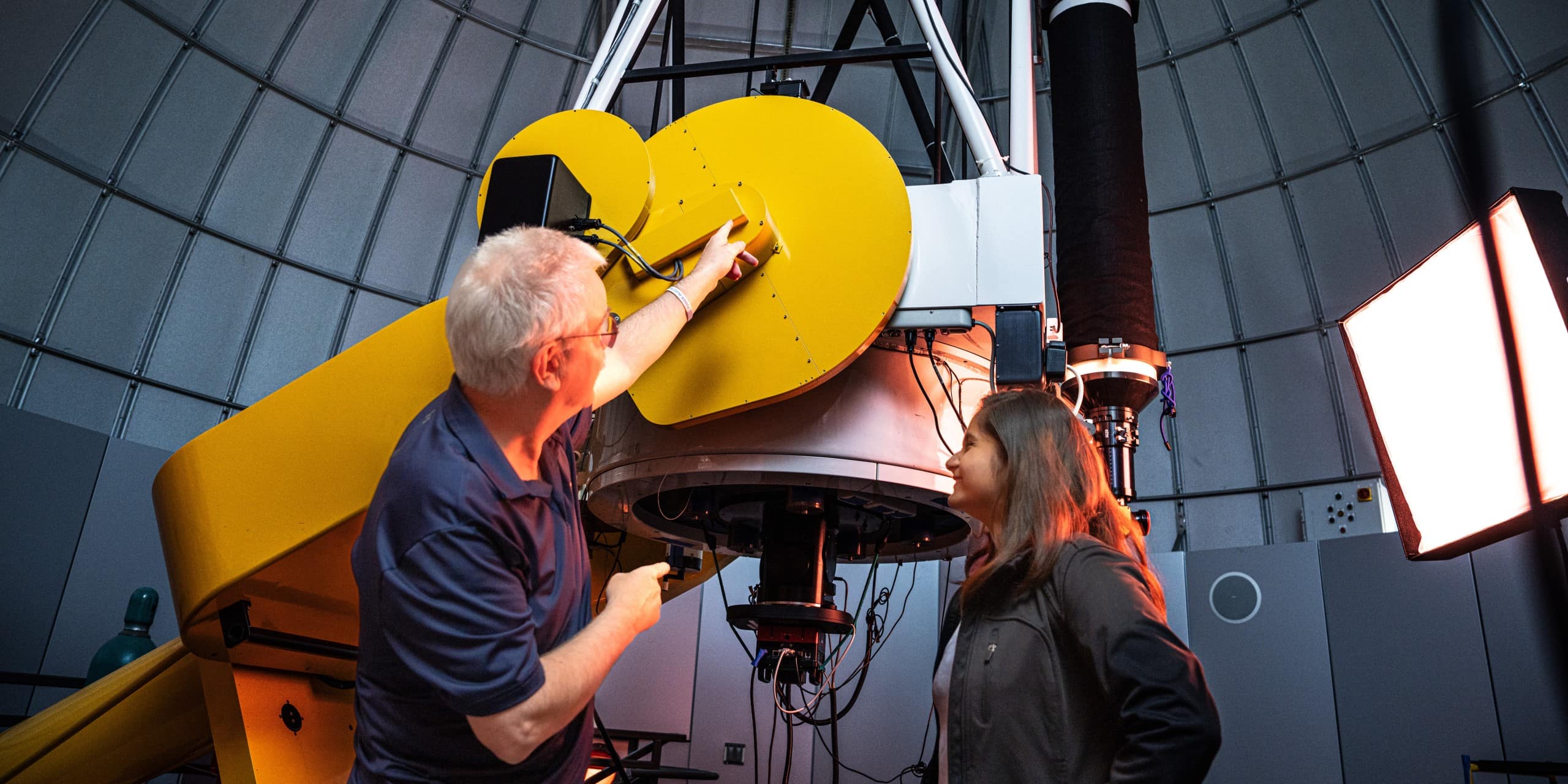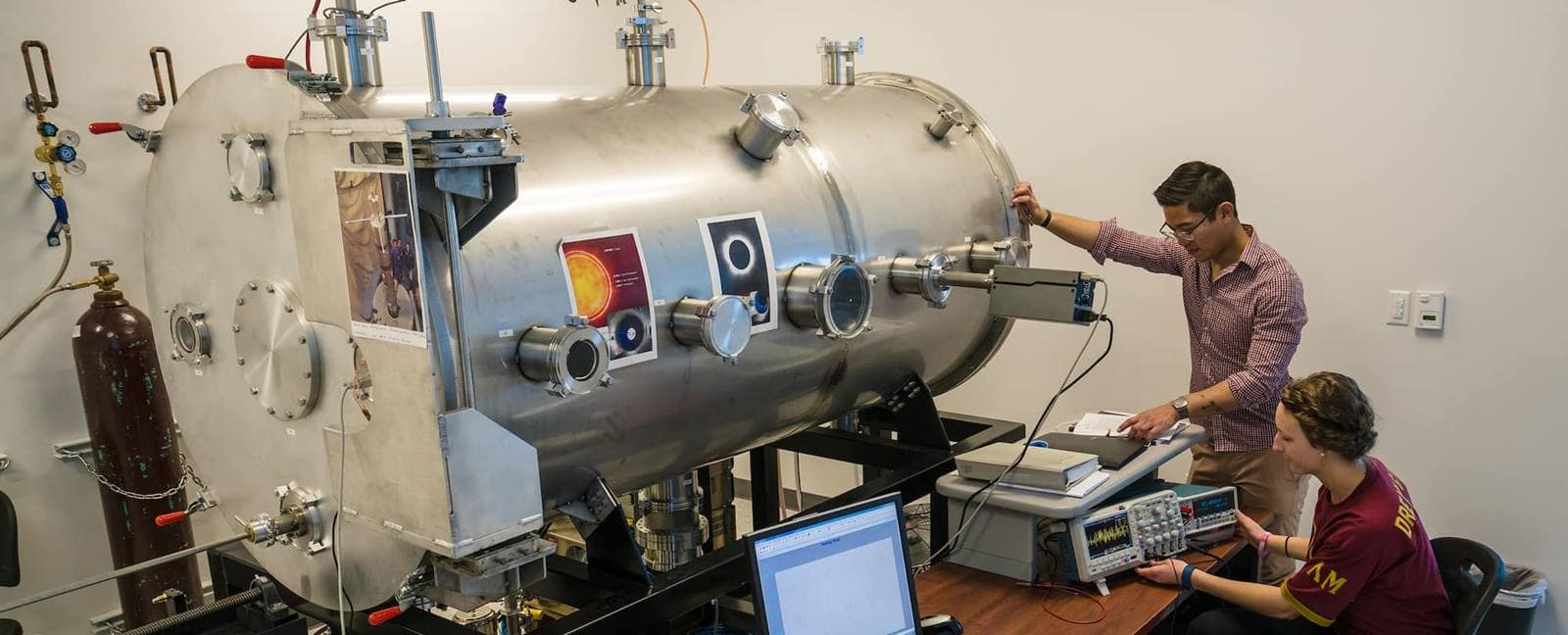
Bachelor of Science in
Engineering Physics
With its strong emphasis on engineering fundamentals, this degree creates a gateway into the space program and a foundation for a range of engineering careers.
The bachelor’s program in Engineering Physics at Embry-Riddle is especially suited to those who want to become part of the future of space exploration and contribute to science conducted beyond the Earth. This program addresses scientific research, planning, and instrumentation associated with space exploration. Students in the program will understand atmospheric physics, spacecraft control systems, as well as design sensors and instruments to take our understanding of the cosmos to the next level. Graduates will have a firm foundation for success in graduate school or challenging careers in engineering and physics in any industry.
The Engineering Physics program at Embry-Riddle is among the largest in the U.S., but compared to other engineering programs it is a small program with fewer than 100 students. This provides quality time with professors and other students who share the same passion for math, engineering, science, and space.
All Engineering Physics majors automatically complete a minor in mathematics. Upper-level mathematics and physics courses in the program give our graduates a firmer theoretical foundation than other engineering programs.
The Engineering Physics program’s unique focus on space offers students the opportunity to participate in space-related research in a variety of areas, such as astrophysics, planetary sciences, spacecraft design and instrumentation, or space weather.
Students are encouraged to participate in campus organizations such as the Mars Society, the American Institute for Aeronautics and Astronautics (AIAA), Mars Aerial Vehicle Project, Society of Physics Students (SPS), Sigma Pi Sigma National Physics Honor Society, Embry-Riddle Future Space Explorers and Developers Society (ERFSEDS), and more.
Approximately two-thirds of Engineering Physics graduates enter the workforce directly after graduation. Others pursue graduate studies in various branches of engineering and science.
The Engineering Physics program is accredited by the Engineering Accreditation Commission of ABET, www.abet.org, under the General Criteria and the Engineering, General Engineering, Engineering Physics, and Engineering Science Program Criteria.
DETAILS
About Engineering Physics at the Daytona Beach, FL Campus
Housed in the Department of Physical Sciences in the College of Arts & Sciences, the Bachelor of Science in Engineering Physics degree program gives students the knowledge and skills of both scientists and engineers.
Students focus on the scientific challenges and planning associated with mission design and research related to space exploration.
However, with its strong emphasis on engineering fundamentals, the curriculum not only creates a gateway into the space program, but also a foundation for a wide range of engineering and physics careers and graduate programs.
A typical first year will include fundamentals like Engineering Drawing and Current Topics in Space Science along with math, science, communication, and general education courses.
The Daytona Beach Campus is home to an Engineering Physics Design Lab featuring high-processing engineering graphics workstations and state-of-the-art software.
The Atmospheric Physics Research Laboratory provides equipment that allows students to test their instruments and sensors in a chamber that closely replicates the vacuum of the space environment.
Students at this campus also benefit from its proximity to Kennedy Space Center. Our Daytona Beach Campus is only 50 miles north of Florida’s Space Coast, enabling students to participate in special programs in the Florida Space Grant Consortium, NASA, and many of the other contracting companies operating in the area.
Embry-Riddle also offers an accelerated program that allows exceptional students to complete both the bachelor’s and master’s degrees in Engineering Physics in five years. Learn more about this accelerated degree program.
General Education Requirements
For a full description of Embry-Riddle General Education guidelines, please see the General Education section of this catalog. These minimum requirements are applicable to all degree programs.
| Communication Theory & Skills * | 9 | |
| Humanities - Lower level * | 3 | |
| Social Sciences - Lower level * | 3 | |
| Humanities or Social Sciences - Lower or Upper level * | 3 | |
| Humanities or Social Sciences - Upper level * | 3 | |
| Computer Science (CS 223) | 3 | |
| Mathematics (MA 241, MA 242) | 8 | |
| Physical and Life Sciences - one course must include a lab (PS 226, PS 226L. PS 227) | 7 | |
| Total Credits | 39 | |
Core Requirements
| Mathematics | ||
| MA 243 | Calculus and Analytical Geometry III | 4 |
| MA 345 | Differential Equations and Matrix Methods | 4 |
| MA 441 | Mathematical Methods for Engineering and Physics I | 3 |
| MA 442 | Mathematical Methods for Engineering and Physics II | 3 |
| Physical Science | ||
| CHM 110 | General Chemistry I | 3 |
| CHM 110L | General Chemistry I Laboratory | 1 |
| PS 228 | Physics III | 3 |
| PS 228L | Physics III Laboratory | 1 |
| PS 290 | Physics Laboratory Practicum | 0 |
| PS 303 | Modern Physics | 3 |
| PS 305 | Modern Physics Laboratory | 1 |
| PS 320 | Classical Mechanics | 3 |
| Engineering | ||
| EGR 120 | Graphical Communications | 3 |
| EP 101 | Current Topics in Space Science | 1 |
| EP 200 | Machine Shop Laboratory | 1 |
| EP 320 | Electro-Optical Engineering | 3 |
| EP 340 | Introduction to Space Systems Design | 2 |
| EP 391 | Microcomputers and Electronic Instrumentation | 3 |
| EP 391L | Microcomputer and Electronic Instrumentation Laboratory | 1 |
| EP 393 | Spaceflight Dynamics | 3 |
| EP 394 | Space Systems Engineering | 3 |
| EP 410 | Space Physics | 3 |
| EP 440 | Engineering Electricity and Magnetism | 3 |
| EP 455 | Quantum Mechanics | 3 |
| or EP 448 | Control System Theory and Engineering Applications | |
| EP 496 | Space Systems Design I | 3 |
| EP 497 | Space Systems Design II | 3 |
| Students Must Choose One AOC | ||
| Spacecraft Systems AOC | ||
| EE 327 | Electrical Engineering Fundamentals | 3 |
| ES 201 | Statics | 3 |
| ES 202 | Solid Mechanics | 3 |
| ES 204 | Dynamics | 3 |
| ES 309 | Fluid Dynamics | 3 |
| Engineering Electives ** | 6 | |
| Spacecraft Instrumentation AOC | ||
| CEC 220 | Digital Circuit Design | 3 |
| CEC 222 | Digital Circuit Design Laboratory | 1 |
| CEC 315 | Signals and Systems | 3 |
| CEC 320 | Microprocessor Systems | 3 |
| CEC 322 | Microprocessor Systems Laboratory | 1 |
| CEC 410 | Digital Signal Processing | 3 |
| CEC 411 | Digital Signal Processing Laboratory | 1 |
| EP 430 | Spacecraft Instrumentation | 3 |
| Engineering Electives** | 3 | |
| Open Electives | 3 | |
| Total Credits | 88 | |
| Total Degree Credits | 127 | |
- **
Choose from AE/CEC/CIV/CS/EE/EGR/EP/ES/ME/SE/SYS 300-400 level courses.
Suggested Plan of Study - Spacecraft Systems Area of Concentration
| Year One | ||
|---|---|---|
| Credits | ||
| EP 101 | Current Topics in Space Science | 1 |
| EGR 120 | Graphical Communications | 3 |
| MA 241 | Calculus and Analytical Geometry I | 4 |
| MA 242 | Calculus and Analytical Geometry II | 4 |
| CHM 110 | General Chemistry I | 3 |
| CHM 110L | General Chemistry I Laboratory | 1 |
| Communication Theory and Skills * | 6 | |
| PS 226 | Physics I | 3 |
| PS 226L | Physics I Laboratory | 1 |
| HU Lower-Level Elective * | 3 | |
| SS Lower-Level Elective * | 3 | |
| Credits Subtotal | 32.0 | |
| Year Two | ||
| CS 223 | Scientific Programming in C | 3 |
| ES 201 | Statics | 3 |
| ES 202 | Solid Mechanics | 3 |
| ES 204 | Dynamics | 3 |
| MA 243 | Calculus and Analytical Geometry III | 4 |
| MA 345 | Differential Equations and Matrix Methods | 4 |
| Communication Theory and Skills * | 3 | |
| HU/SS Lower or Upper Elective * | 3 | |
| PS 227 | Physics II | 3 |
| PS 228 | Physics III | 3 |
| PS 228L | Physics III Laboratory | 1 |
| Credits Subtotal | 33.0 | |
| Year Three | ||
| EP 200 | Machine Shop Laboratory | 1 |
| EE 327 | Electrical Engineering Fundamentals | 3 |
| EP 340 | Introduction to Space Systems Design | 2 |
| EP 391 | Microcomputers and Electronic Instrumentation | 3 |
| EP 391L | Microcomputer and Electronic Instrumentation Laboratory | 1 |
| EP 393 | Spaceflight Dynamics | 3 |
| EP 394 | Space Systems Engineering | 3 |
| ES 309 | Fluid Dynamics | 3 |
| MA 441 | Mathematical Methods for Engineering and Physics I | 3 |
| MA 442 | Mathematical Methods for Engineering and Physics II | 3 |
| PS 303 | Modern Physics | 3 |
| PS 305 | Modern Physics Laboratory | 1 |
| PS 320 | Classical Mechanics | 3 |
| Credits Subtotal | 32.0 | |
| Year Four | ||
| EP 320 | Electro-Optical Engineering | 3 |
| EP 410 | Space Physics | 3 |
| EP 440 | Engineering Electricity and Magnetism | 3 |
| EP 455 | Quantum Mechanics | 3 |
or EP 448
|
Control System Theory and Engineering Applications | |
| EP 496 | Space Systems Design I | 3 |
| EP 497 | Space Systems Design II | 3 |
| Engineering Elective *** | 6 | |
| PS 290 | Physics Laboratory Practicum | 0 |
| HU/SS Upper-Level Elective * | 3 | |
| Open Electives | 3 | |
| Credits Subtotal | 30.0 | |
| Credits Total: | 127.0 | |
Suggested Plan of Study - Spacecraft Instrumentation Area of Concentration
| Year One | ||
|---|---|---|
| Credits | ||
| EP 101 | Current Topics in Space Science | 1 |
| EGR 120 | Graphical Communications | 3 |
| MA 241 | Calculus and Analytical Geometry I | 4 |
| MA 242 | Calculus and Analytical Geometry II | 4 |
| CHM 110 | General Chemistry I | 3 |
| CHM 110L | General Chemistry I Laboratory | 1 |
| Communication Theory and Skills * | 6 | |
| PS 226 | Physics I | 3 |
| PS 226L | Physics I Laboratory | 1 |
| HU Lower-Level Elective * | 3 | |
| SS Lower-Level Elective * | 3 | |
| Credits Subtotal | 32.0 | |
| Year Two | ||
| CEC 220 | Digital Circuit Design ** | 3 |
| CEC 222 | Digital Circuit Design Laboratory ** | 1 |
| CEC 315 | Signals and Systems ** | 3 |
| CEC 320 | Microprocessor Systems ** | 3 |
| CEC 322 | Microprocessor Systems Laboratory ** | 1 |
| CS 223 | Scientific Programming in C | 3 |
| EP 200 | Machine Shop Laboratory | 1 |
| MA 243 | Calculus and Analytical Geometry III | 4 |
| MA 345 | Differential Equations and Matrix Methods | 4 |
| Communication Theory and Skills * | 3 | |
| PS 227 | Physics II | 3 |
| PS 228 | Physics III | 3 |
| PS 228L | Physics III Laboratory | 1 |
| Credits Subtotal | 33.0 | |
| Year Three | ||
| EP 340 | Introduction to Space Systems Design | 2 |
| EP 391 | Microcomputers and Electronic Instrumentation | 3 |
| EP 391L | Microcomputer and Electronic Instrumentation Laboratory | 1 |
| EP 393 | Spaceflight Dynamics | 3 |
| EP 394 | Space Systems Engineering | 3 |
| MA 441 | Mathematical Methods for Engineering and Physics I | 3 |
| PS 303 | Modern Physics | 3 |
| PS 305 | Modern Physics Laboratory | 1 |
| PS 320 | Classical Mechanics | 3 |
| Engineering Elective *** | 3 | |
| HU/SS Lower or Upper Elective * | 3 | |
| Open Electives | 3 | |
| Credits Subtotal | 31.0 | |
| Year Four | ||
| CEC 410 | Digital Signal Processing ** | 3 |
| CEC 411 | Digital Signal Processing Laboratory ** | 1 |
| EP 320 | Electro-Optical Engineering | 3 |
| EP 410 | Space Physics | 3 |
| EP 430 | Spacecraft Instrumentation ** | 3 |
| EP 440 | Engineering Electricity and Magnetism | 3 |
| EP 455 | Quantum Mechanics | 3 |
or EP 448
|
Control System Theory and Engineering Applications | |
| EP 496 | Space Systems Design I | 3 |
| EP 497 | Space Systems Design II | 3 |
| MA 442 | Mathematical Methods for Engineering and Physics II | 3 |
| PS 290 | Physics Laboratory Practicum | 0 |
| HU/SS Upper-Level Elective * | 3 | |
| Credits Subtotal | 31.0 | |
| Credits Total: | 127.0 | |
- *
Any of the Embry-Riddle courses listed in the General Education Requirements list can be taken assuming prerequisite requirements are met. Courses from other institutions are acceptable if they fall into these broad categories and are at the level specified above in the Engineering Physics vertical outline.
- **
These are the courses that are different from those in the Space Systems Area of Concentration.
- ***
Any 3xx-4xx course with one of the following prefixes is an acceptable engineering elective: AE/CEC/CIV/CS/EE/EGR/EP/ES/ME/SE/SYS.
Get Started Now:
Summary
127 Credits
Estimate your tuition by using the Tuition Calculator
View Financial Aid Information
Learn about our General Education
Find out about transferring credits to this degree
Learn more about our Veterans & Military benefits
View our Academic Calendar
